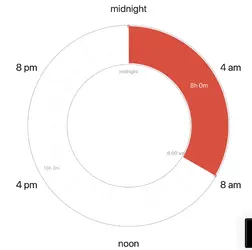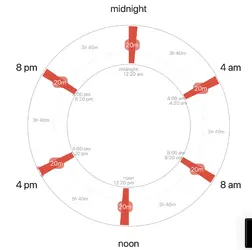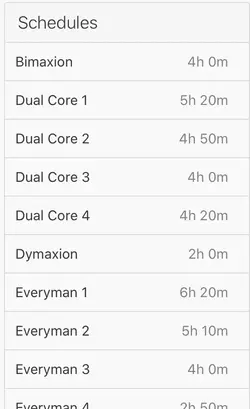Lately, I've been revisiting the idea of adopting a polyphasic sleep schedule—specifically the Uberman schedule, a challenging but transformative sleep pattern I previously stuck with for 8-10 months back in 2009-2010. For those unfamiliar, the Uberman schedule consists of six 20-minute naps evenly spaced throughout the day. While this approach requires rigorous discipline and precise timing, it's something I believe could revolutionize the way we perceive and use our time.
Adapting to the Uberman schedule is a bit like going through boot camp for sleep; it's hard, especially when you're working a high-stress tech job filled with Type-A personalities. But the secret is in the struggle. The tougher you fight to stick to the schedule, the faster your body and mind adapt to this new routine.
During my research, I stumbled upon a sleep adaptation technique dubbed "Naptation" on a now-defunct forum, trypolyphasic.com. The method involves deliberately entering a sleep-deprived state (by staying awake for 24-48 hours) and then initiating a 15-minute nap every hour. Gradually, you lengthen the interval between naps until you achieve a stable sleep schedule. This approach worked well for me a few times, but ironically, my most successful stint was when I dived right into the Uberman schedule without any transitional steps.
Once you successfully adapt, you'll begin to experience something akin to time dilation. Days and nights start to blur into a single continuum of wakefulness and short naps. This gives you a fresh, almost transcendent perspective on life, unburdened by the conventional cycles that dictate the lives of most people.
Many people adopt a polyphasic sleep schedule for utilitarian reasons, like wanting to get more work done or manage household chores efficiently. While those are valid motivations, they aren't the driving force for me. I see polyphasic sleep as an opportunity to experience a different rhythm of life altogether. One where you can be creatively productive at 3 AM, then rejuvenate with a quick 15-minute nap before taking on the day.
The unique experience of time dilation, heightened creativity, and the sheer number of waking hours at your disposal can make it all worthwhile. It's certainly not a lifestyle for everyone, but for those who like to stray from the norm, it offers an entirely different way to live, work, and even dream.
The dreams you have during something like the Uberman schedule are unlike any you'll experience in a monophasic sleep cycle. Typically, as a monophasic sleeper, you enter and exit the REM phase approximately once every 90 minutes, oscillating between varying levels of wakefulness and deeper sleep. In contrast, the Uberman sleep schedule pushes you directly into REM sleep during each nap, almost guaranteeing you'll encounter vivid and sometimes lucid dreams.
On a regular basis, I was having prolonged lucid dreaming experiences that felt like they were hours long. Imagine if dreams were a canvas, and with each cycle of REM in monophasic sleep, you could only paint with shades of gray. On Uberman schedule, I had the entire spectrum of colors at my disposal.
If you place significance on dreams, whether for psychological introspection, creative inspiration, or spirituality, Uberman was an amazing playground for exploration. Each nap could be likened to a mini-vacation, where you unlock the doors of perception and venture into landscapes of a profound clarity.
Then I got a cold and it broke everything. I've made a few attempts to return to it over the years, but life changes quick when you've got kids and bills and the world's on fire... But it would be fun to return to it. Even if it could only be for a short bit.
I'm thinking about it.






